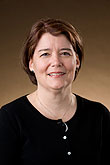Patty McBride heads CMS Center for US LHC
 |
|
Patty McBride
|
Fermilab's CMS Center has a new director. Patty McBride, the deputy head of the former Computing Division, will now lead the CMS Center.
"2012 looks like it'll be a good year for CMS. We're expecting a lot of exciting results," McBride said. "It'll be a great opportunity for me to concentrate on the experiment and to work with the whole Fermilab CMS team."
As center head, McBride will interact with scientists at Fermilab and in the CMS group at CERN. A member of the CMS since 2005, McBride has already worked closely with the group.
"Patty has a tremendous range of experience," said Joel Butler, the operations program manager for US CMS. "She's really superbly qualified for the role of center head."
McBride contributed to the building and commissioning of CMS, as well as for the first round of data collection and analysis. She will oversee the next year of data collection and the two-year long shutdown of CMS for upgrades.
"Patty brings a wealth of experience to running CMS from the computing side of things," Greg Bock, associate laboratory director for research, said. "She has a vision for the future of CMS, and she will ensure that the collaboration is well-attended to."
Vicky White, the associate lab director for Computing, agreed.
"We know she'll do an excellent job as the head of the CMS Center, just as she did an excellent job in computing," White said.
Lothar Bauerdick, McBride's predecessor, created the CMS Center and led the group through the latest round of data analysis.
"Lothar did a wonderful job shepherding us to this point," Butler said. "Patty will take us through the center's refocusing on physics analysis and upgrades. We're sure she'll excel in this new position."
McBride, who served as chair of the Division of Particles and Fields for the American Physical Society and is a member of the Preparatory Group for European Strategy for Particle Physics, plans to work on finding a beneficial balance for Fermilab's role in the detector, the computing aspects and the physics.
"She's a leader in the field. Everyone is delighted that she's moving into the position," Bock said.
—Ashley WennersHerron
|